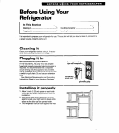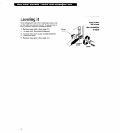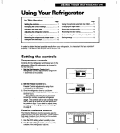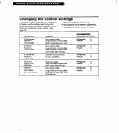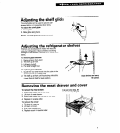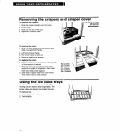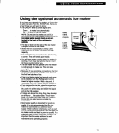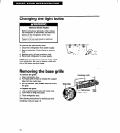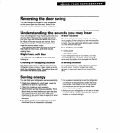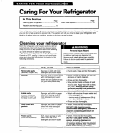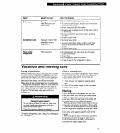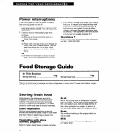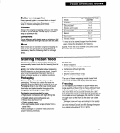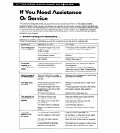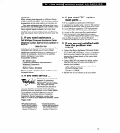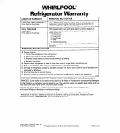
Butter or margarine
Keep opened butter in covered dish or closed
compartment. When storing an extra supply,
wrap in freezer packaging and freeze.
Cheese
Store in the original wrapping until you are ready
to use it. Once opened, rewrap tightly in plastic
wrap or aluminum foil.
Leftovers
Cover leftovers with plastic wrap or aluminum foil.
Plastic containers with tight lids can also be used.
Meat
Most meat can be stored in original wrapping as
long as it is air and moisture proof. Rewrap if
necessary. See the following chart for storage
times.
TYPE
APPROXIMATE TIME
(DAYS)’
r Chicken
1 to2
I
Ground beef
1 to2
Steaks and roasts
3
to
5
r Cured meats
7to 10
I
Bacon
5
to
7
Cold cuts
3
to
5
Variety meats 1 to 2
* f meat is to be stored longer than the times
~fiven, follow the directions for freezing.
N ATE: Fresh fish and shellfish should be used
tt- e same day as purchased.
Storing frozen food
The freezer section is designed for storage of
commercially frozen food and for freezing food at
home.
NOTE:
For further information about preparing
food for freezing or food storage times, contact
your local Cooperative Extension Service or
check a freezer guide or a reliable cookbook.
Packaging
The secret of successful freezing is in the
packaging. The way you close and seal the
package must not allow air or moisture in or out.
Packaging done in any other way could cause
food odor and taste transfer throughout the
refrigerator and drying of frozen food.
Packaging recommended for use:
l
Rigid plastic containers with tight-fitting lids
l
Straight-sided canning/freezing jars
l
Heavy-duty aluminum foil
l
Plastic-coated paper
l
Non-permeable plastic wraps (made from a
Saran film)
Follow package or container instructions for
proper freezing methods.
D B not use:
l
3read wrappers
. Ion-polyethylene plastic containers
. Containers without tight lids
l
Naxed paper
. Naxed-coated freezer wrap
. rhin, semi-permeable wrap
TI le use of these wrappings could cause food
o( lor, taste transfer and drying of frozen food.
Freezing
DI) not expect your freezer to quick-freeze any
la ‘ge quantity of food. Put no more unfrozen food
in o the freezer than will freeze within 24 hours.
(ho more than 2 to 3 pounds of food per cubic
fo It of freezer space.) Leave enough space for air
to circulate around packages. Be careful to leave
er ough room at the front so the door can close
tic htly.
Storage times will vary according to the quality
of the food, the type of packaging or wrap used
(a r and moisture proof) and the storage tempera-
tu e (which should be 0°F [-17.8”C]).
17



